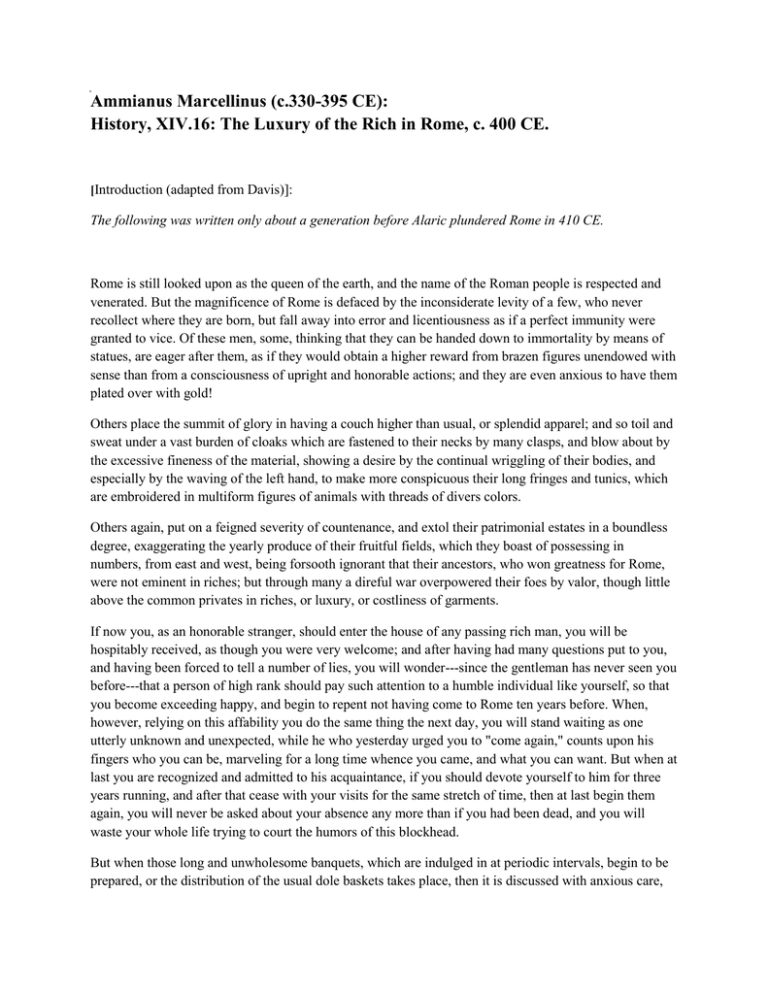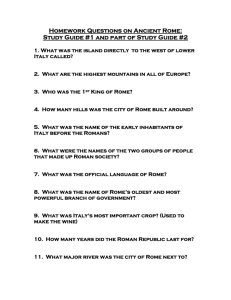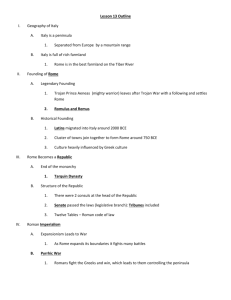Ammianus Marcellinus (c.330-395 CE):
advertisement

Ammianus Marcellinus (c.330-395 CE): History, XIV.16: The Luxury of the Rich in Rome, c. 400 CE. [Introduction (adapted from Davis)]: The following was written only about a generation before Alaric plundered Rome in 410 CE. Rome is still looked upon as the queen of the earth, and the name of the Roman people is respected and venerated. But the magnificence of Rome is defaced by the inconsiderate levity of a few, who never recollect where they are born, but fall away into error and licentiousness as if a perfect immunity were granted to vice. Of these men, some, thinking that they can be handed down to immortality by means of statues, are eager after them, as if they would obtain a higher reward from brazen figures unendowed with sense than from a consciousness of upright and honorable actions; and they are even anxious to have them plated over with gold! Others place the summit of glory in having a couch higher than usual, or splendid apparel; and so toil and sweat under a vast burden of cloaks which are fastened to their necks by many clasps, and blow about by the excessive fineness of the material, showing a desire by the continual wriggling of their bodies, and especially by the waving of the left hand, to make more conspicuous their long fringes and tunics, which are embroidered in multiform figures of animals with threads of divers colors. Others again, put on a feigned severity of countenance, and extol their patrimonial estates in a boundless degree, exaggerating the yearly produce of their fruitful fields, which they boast of possessing in numbers, from east and west, being forsooth ignorant that their ancestors, who won greatness for Rome, were not eminent in riches; but through many a direful war overpowered their foes by valor, though little above the common privates in riches, or luxury, or costliness of garments. If now you, as an honorable stranger, should enter the house of any passing rich man, you will be hospitably received, as though you were very welcome; and after having had many questions put to you, and having been forced to tell a number of lies, you will wonder---since the gentleman has never seen you before---that a person of high rank should pay such attention to a humble individual like yourself, so that you become exceeding happy, and begin to repent not having come to Rome ten years before. When, however, relying on this affability you do the same thing the next day, you will stand waiting as one utterly unknown and unexpected, while he who yesterday urged you to "come again," counts upon his fingers who you can be, marveling for a long time whence you came, and what you can want. But when at last you are recognized and admitted to his acquaintance, if you should devote yourself to him for three years running, and after that cease with your visits for the same stretch of time, then at last begin them again, you will never be asked about your absence any more than if you had been dead, and you will waste your whole life trying to court the humors of this blockhead. But when those long and unwholesome banquets, which are indulged in at periodic intervals, begin to be prepared, or the distribution of the usual dole baskets takes place, then it is discussed with anxious care, whether, when those to whom a return is due are to be entertained, it is also proper to ask in a stranger; and if after the question has been duly sifted, it is determined that this may be done, the person preferred is one who hangs around all night before the houses of charioteers, or one who claims to be an expert with dice, or affects to possess some peculiar secrets. For hosts of this stamp avoid all learned and sober men as unprofitable and useless---with this addition, that the nomenclators also, who usually make a market of these invitations and such favors, selling them for bribes, often for a fee thrust into these dinners mean and obscure creatures indeed. ….. On account of the frequency of epidemics in Rome, rich men take absurd precautions to avoid contagion, but even when these rules are observed thus stringently, some persons, if they be invited to a wedding, though the vigor of their limbs be vastly diminished, yet when gold is pressed in their palm they will go with all activity as far as Spoletum! So much for the nobles. As for the lower and poorer classes some spend the whole night in the wine shops, some lie concealed in the shady arcades of the theaters. They play at dice so eagerly as to quarrel over them, snuffing up their nostrils, and making unseemly noises by drawing back their breath into their noses:---or (and this is their favorite amusement by far) from sunrise till evening, through sunshine or rain, they stay gaping and examining the charioteers and their horses; and their good and bad qualities. Wonderful indeed it is to see an innumerable multitude of people, with prodigious eagerness, intent upon the events of the chariot race! Source: From: William Stearns Davis, ed., Readings in Ancient History: Illustrative Extracts from the Sources, 2 Vols. (Boston: Allyn and Bacon, 1912-13), Vol. II: Rome and the West, pp. 224-225, 239-244, 247-258, 260-265, 305-309. Gregory the Great, Registrum 9, 232 (August 599). Daily I grow weaker from the pain, and I sigh longingly for the remedy of death. So much sickness of fevers has assaulted the clergy and people of this city that practically no free man, no slave remains who is good for any work or service. From the neighboring towns, the devastations of the epidemic are announced to us every day; how Africa is wasted by epidemic and fevers, you know more exactly, I suppose, for being closer to it. People arriving from the East describe worse desolations still. By all these things, as the end of the world draws near, you know that the affliction is general…. Gregory of Tours, History of the Franks, c. 540 CE Book III.32 (p. 189) Next Theudebert marched into Italy and laid hands on a great amount of booty. Those regions are apparently very unhealthy: Theudebert's army was greatly harassed by a series of epidemics and many of his soldiers died there. When he saw what was happening, Theudebert returned home, he and his troops carrying vast riches which they had stolen. He is said to have advanced as far as Pavia. Later on he sent Buccelin back there. Buccelin conquered Upper Italy and subjected it to the rule of King Theudebert. ... He conquered the whole of Italy and pushed forward to the sea. From Italy he dispatched a great store of treasure to Theudebert. 539CE -- but note, Buccelin's campaign took place in 553-4, well after the death of Theudebert. MIT OpenCourseWare http://ocw.mit.edu 21H.134J / 14.70J Medieval Economic History in Comparative Perspective Spring 2012 For information about citing these materials or our Terms of Use, visit: http://ocw.mit.edu/terms.





